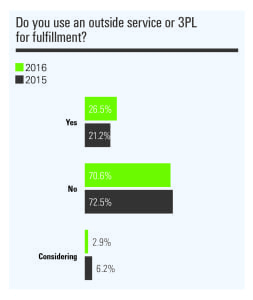
While there are many clear advantages to using a third-party fulfillment (3PL) partner for outsourcing some or all of your operations, the majority of merchant companies still opt for keeping these functions in house and firmly within their control.
Among respondents to the MCM Outlook Survey, the use of a 3PL is growing slightly but still represents by far a minority approach.
In 2016, 26.5% of respondents said they use a 3PL, up from 21.2% in 2015, while the rest said they handle fulfillment internally. Of those who said no, only 2.9% said they are considering use of a 3PL, down from 6.2% in 2015.
Mark Stoye, director of ecommerce fulfillment operations for apparel seller Tobi.com, said he was not using or considering a 3PL at this point. “We have developed a very efficient and cost effective fulfillment system and do not wish to lose that hands-on connection with our customer,” Stoye said.
Similarly, Ian Richardson, manager of IT and order operations for Victorian Trading Co., an online and catalog seller of Victorian era clothing and gifts, said a 3PL partnership doesn’t make sense for its fulfillment operation at this time. “We ship around 300,000 packages a year and they are almost entirely small package, so our discounts are very competitive,” Richardson said.
Still, there are situations where outsourcing fulfillment operations to a 3PL can make good business sense, given rising costs and growing scale.
Curt Barry, president of F. Curtis Barry & Co., wrote recently for Multichannel Merchant about the decision process in considering a 3PL and some of the areas where companies can see the greatest benefits:
Cost per order: A 3PL can provide a lower cost per order when compared to internally managed operations. This isn’t always true but it can be for small-to-moderate-sized companies that don’t have four season businesses.
Focusing management time: A 3PL allows companies to concentrate management time on marketing, merchandising and ecommerce analysis. Some large companies understand fulfillment isn’t their core competency, and thus a 3PL makes sense.
Scale to peak: During the holiday season, a 3PL allows companies to successfully process customer orders without hiring additional staff and requiring greater internal capacity.
Lower capital investment: A 3PL can help reduce capital outlays for things like new fulfillment facilities, order management and warehouse systems, telephone technology and in some cases website platforms.
Reduced time-to-customer and shipping costs: A 3PL can provide distribution across the country so that you can deliver one-day ground to a high percentage of your customers. Some 3PLs can deliver items within hours of receiving an order in certain cities.
Distribution of international orders: Many multichannel companies use 3PL partners to serve Canada, Europe and Asia.
Direct shipping: Store-based retailers sometimes contract with 3PL partners to ship direct orders from their ecommerce marketplaces, rather than bring small-order pick/pack/ship into their DCs.
Mike O’Brien is Senior Editor of Multichannel Merchant
